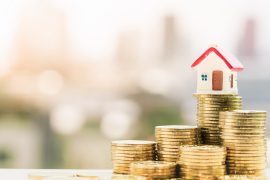Inside the mind of a true visionary lies the unbridled wonder of progressive thinking. And only with such thoughts can a person alter the aspects of society.
Former REHAB President and present Managing Director of Building for Future Ltd, Engr. Tanveerul Haque Probal is one such visionary, who continues to be a pillar behind the success of the real estate sector. Having being nominated and awarded the CIP for the 3rd time in his career this year, we get up close and exclusive with one of the most esteemed corporate figures of Bangladesh.
How do you see the future of real estate evolve in Bangladesh?
I believe the future of real estate in Bangladesh has good prospects, particularly because everything is being gradually decentralized. A lot has changed in a very short span of time. Infrastructure development is on the rise. Elevated express-ways, metro rails and train services are being transformed for the better.
In light of these developments, commuting will become easier. As a direct result, real estate will grow and stretch out beyond Dhaka to outer districts. Supporting sectors of the real estate industry will also mature. Furthermore, the electricity sector is being developed, and when power reaches beyond the outskirts of Dhaka, people will become more confident about investing in real estate outside the city.
What challenges do you foresee for the real estate sector going forward and how do you think they can tackle it?
Real estate, like many other products and services, has challenges to overcome. See, real estate is like a machine; raw materials go in, and come out as a product; in other words, a property. I perceive raw materials as the biggest challenge when it comes to real estate and the basic raw material of real estate is ‘land’. If you don’t have land, what are you going to do with cement? What are you going to do with rods and such?
The government has already declared that you cannot develop housing on plantation areas. Yet you see across the country the rule is not being followed. So in order to tackle this problem, Detailed Area Planning is required on a macro-scale perspective.
If we delve deeper, on a micro-scale, a challenge which still exists for developers is that they have to go through many departments before starting a project. There is no one stop service centers by the government which makes it difficult to complete the project, particularly when we have to go through 12 departments. So if the government were to take an initiative to aid us in this department, I think we would be able to complete projects a whole lot faster.
Do you think the real estate sector has been a contributing factor to the GDP of Bangladesh and how?
If there is a crash in the real estate market, then the entire economy will crash. See, the real estate sector comprises of many sub-sectors in the economy. It is aided by various industries like cement, rod, brick, tiles, paint, glass, sanitary wares, electrical fittings and so on. There is a multitude of sectors which have direct ties to ours. Moreover, these sub-sectors employ a good portion of the labor force in the economy. So yes, I do believe that the real estate sector has always been a contributing factor to the Bangladesh economy. The real estate sector is the only sector which guides all other sectors.
Registration fees on buying homes have been constantly high over the past several years in Bangladesh. What kind of impact does it have on the market overall?
Yes, registration cost is a very important issue and has a bad impact on this market. This cost varies from 14% to 20% and even more depending on the location and nature of the product. The components of this cost consists of stamp cost, registration fee, VAT, gain tax, local government fee, etc. When the size of an apartment is more than 1600 square feet, the registration cost increases compared to smaller flats. Also, the registration cost is different and higher in case of commercial spaces. Furthermore, for a lease hold land like Uttara, Banani, Gulshan, etc., there is another cost called “transfer fee” which is also added with the registration cost. If we compare these costs with other countries of the world, our cost is very high. Even in neighboring SAARC countries, this registration cost is within single digit. To encourage the real estate sector, earlier in Sri Lanka the cost was kept nil for some time.
Another very import issue is the secondary market which is not growing due to high registration cost. When we buy an old and used car, its registration cost will be much lower than that of the new one. But if we buy an old and previously registered apartment from a buyer, the registration cost is the same as before. This is a big hindrance against growing a secondary real estate market.
How do you think the real estate market will be overall affected in the long term if construction material costs keep rising?
There is no doubt that construction cost is high and increasing, and we are all facing its impact. When we take on a new project, we do necessary designs & drawings, take approval from the authorities, make an estimate based on our design and soil conditions and afterwards, fix a price for the product. The construction period varies from 24 months to 48 months depending on the volume of the project. Prospective customers book their shop/flat/office space and keep on paying their installments according to the agreement. But during that construction period, if for whichever reason, the cost of any material increases, the estimate changes as well as the price. But the developer can hardly go for a revised price where they already took the booking and are receiving installments from the purchasers.
So, a sudden price increase of construction materials is a very dangerous issue for any developer which is not desirable.
Do you think the real estate sector helps the government achieve environmental sustainability as part of their Vision 2021?
In all honesty, there is a stigma over the media that the real estate sector, particularly developers, when they create the buildings they somehow damage the environment. See in 2010, there was an initiative by the government called FAR (Floor Area Ratio). When it was implemented, the country did achieve a sense of sustainability. However the higher you go, the area of construction has to be the same. As a result, it provokes better planning of air passageway throughout the buildings. The value of FAR depends on the size of land and the width of front road. The higher the value of FAR, the more will be the construction area irrespective of how many floors we construct.
Aside from that, I believe that LEED buildings need to be implemented and certified. These buildings are expensive to construct. So if the government can encourage builders by subsidizing yearly taxes and by giving reduced rates for utility services, etc., I believe we can aid the government in creating a sustainable environment.
From the perspective of a CIP, what kind of initiatives can the government provide in stimulating the real estate sector that might benefit the economy as a whole?
Firstly, the government should make land availability and acquirement formalities easier for developers. The government has undertaken a project in Uttara where the price per square feet is BDT. 5,000 to BDT. 6,000. Because the price of land is very low for the government, they could further lower the price. In case of private developers, we have no access to cheaper lands and thus our price per square feet is much higher.
What the government can do is develop road connectivity, install necessary utility services and offer private developers a reasonable price for the land. In this way, real estate will grow. There was once a time when Motijheel was the major commercial hub. But due to the development of other commercial areas like Mohakhali, Karwan Bazar, etc., Motijheel lost its commercial character. However the good news is due to the up-coming elevated expressway and metro-rail projects, Motjheel can recover its status again.
On a scale of 10, how would you rate the real estate market performance for the present year in comparison to 2017?
In my personal opinion, in comparison to 2017, it is somewhat better. But as the upcoming elections are on the horizons, the sector could face a fair share of stagnancy. In my experience from what I have observed, whenever there is a stable government and political environment, the real estate sector will be good.



